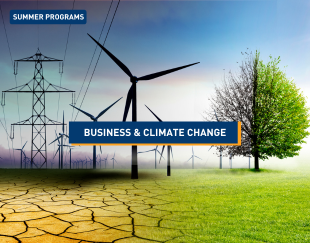Sustainable Finance and Investment
Summer Program

When & Where?
On-Campus: June 30 - July 11 Summer 2025
Applications will open towards the end of the year for Summer 2025.
We invite you to pre-register your interest for 2025 to be alerted when the application portal opens.
Why this Summer Program?
The advantages of the "Sustainable Finance and Investment" program for participants are manifold:
• In-depth understanding of sustainable finance: The program goes beyond merely explaining green financial products or ESG filters, allowing participants to understand how the financial industry is reinventing itself to channel capital towards a net-zero economy.
• Expanded skill set: Participants will learn that sustainable finance and ESG criteria are no longer limited to a few specialists but are now integrated into all daily operations of the financial sector.
• Holistic approach: The program shows how banks and financial institutions are adopting a holistic approach by integrating sustainability and energy transition throughout their value chains, involving professionals from diverse backgrounds.
• Driving change through finance: Participants will grasp the crucial role of finance as a driver of change, collaborating with stakeholders across value chains to accelerate the transition to environmentally friendly practices.
• Diversification of investment opportunities: By exploring innovative business models and emerging sectors such as the circular economy, nature-based solutions, and new energy sources, participants will gain a broader view of investment opportunities in environmentally impactful areas.
• Understanding risks and challenges: Participants will be trained to identify risks associated with new economic models and technologies, as well as specific challenges related to financing these emerging economic actors.
• Development of practical skills: Participants will learn the key success factors for financing the transition to a sustainable economy, including the need for advisory expertise and a combined debt/equity approach to effectively mobilize capital.
• Professional opportunities: By understanding emerging trends in sustainability-related investments, participants will be better prepared to seize career opportunities in expanding fields such as private equity, private debt, and green infrastructure funds.
Content Overview
A growing consensus among all business stakeholders indicates that transition is imperative, and we must decarbonize the economy. According to the International Energy Agency (IEA), a substantial amount of investment - more than $120 trillion globally between now and 2050 - is required to meet this net-zero target. This translates to a minimum annual investment deployment of $4 to $6 trillion. Scientists are also warning about the impacts of destroying our biosphere. This will necessitate an additional $4 to $6 trillion in investments per year to transform our agriculture and food industry to protect Earth's biodiversity.
The Sustainable Finance and Investment program this summer is about understanding how the financial industry is reinventing and innovating to redirect capital towards accelerating the transformation of the economy toward a Net Zero world.
As business models evolve and new technologies emerge, ESG and sustainable finance are no longer the domain of a select few specialists. The entire financial sector is integrating sustainability and energy transition into its day-to-day operations. You will understand how finance is a driver for change, as the financial sector plays a key role, partnering with all parties involved throughout value chains. It is also pioneering innovative business models by supporting emerging energy and impact tech leaders. Discover how to finance developing cutting edge technologies, new business models such as circular economy, nature-based solutions, carbon sequestration, and new energy sources such as hydrogen and biofuels.
As a student, you will learn the key success factors for financing the transition, including advisory expertise required and adopting a joint debt/equity approach to unlock capital deployment. Finally, you will explore how investment opportunities in real assets are skyrocketing and how private equity, private debt, and infrastructure funds are taking the lead in transition investments, establishing green and transition funds daily to channel these investments.
Learning Outcomes
The program offers students thorough and relevant training in the filed of sustainable finance and responsible investment, preparing them to address challenges and seize opportunities in a world transitionaling towards environmental and social sustainability.
Upon successful completion of the program participants will have the knowledge and skills to:
- Command an understanding of global drivers and challenges of investments in a net-zero economy.
- Identify the key actors from the financial and the private sectors driving change toward a sustainable future.
- Grasp the principles of sustainable finance and investments and comprehend the tools available to banks, investors, and the private sector to accelerate the transition.
- Appreciate the role of sustainable finance, including new financing mechanisms and the evolving business models of the finance industry across industrial value chains and emerging technologies and businesses.
- Recognize the importance of companies' new disclosure obligations in response to ESG rating agencies and the management of environmental and social risks.
- Understand the significant role played by private equity, infrastructure, and debt funds in driving the transition.
Pre-requisites
This intermediate program is accessible to motivated, ambitious participants with at least 2 years of undergraduate studies in a related field, such as Economics, Corporate Finance or Accounting, at the time of the program. Students from engineering backgrounds are also welcome.
We welcome students who aspire to make an impact in the public, private and financial sectors by building innovative financial solutions to drive investments toward a decarbonated and sustainable economy.
Assessment
Grading will be determined as follows:
• Presence & Participation: 30%
• Individual Assignments: 10%
• Group Project*: 60%
*Participants will work throughout the program on a team project inspired by a real life financing, investment or advisory financial case study. They will be coached and supervised by professionals from the financial industry and investment banking. All projects are presented to a jury of professionals and experts at the end of the module.
Participants who successfully complete the program will earn 5 ECTS credits. Full attendance is required to obtain the Program Certificate.
All students who are seeking credit are encouraged to consult their home academic institution to validate credit transfer.
The Summer Experience

The HEC Paris Summer Program “Business & Climate Change” takes a deep dive into the challenges facing companies as they move to incorporate national and international energy and climate policies into...

As the Marketing & Recruitment Manager for the Summer & Youth programs at HEC Paris, I was curious to know what ChatGPT thinks of our Summer Programs. This is the result I got.

If you've recently noticed a flurry of activity with an HEC Summer School hashtag, that's because we have just concluded a highly successful 2023 season and participants from over 50 countries are now...